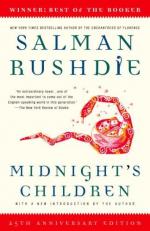|
This section contains 9,300 words (approx. 31 pages at 300 words per page) |

|
SOURCE: Heffernan, Teresa. “Apocalyptic Narratives: The Nation in Salman Rushdie's Midnight's Children.” Twentieth-Century Literature 46, no. 4 (winter 2000): 470-91.
In the following essay, Heffernan argues that, in Midnight's Children, Rushdie explores “an alternative, though equally apocalyptic, concept of the nation, the Islamic umma.”
The radically performative laying down of the law by the legislator must create the very context according to which that law could be judged to be just: the founding moment, the pre-, is always already inhabited by the post-.
—Geoffrey Bennington (132)
Thus the veil had to fall so that with it the strongholds of reactionaries preventing women from being educated and participating in public life would fall.
—Amina Said (360)
In the Book of Revelation, John is living in forced exile on the island of Patmos.1 Opposed to and alienated from the existing social and political order, he predicts the overthrow of a corrupt world and the everlasting...
|
This section contains 9,300 words (approx. 31 pages at 300 words per page) |

|


